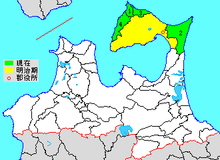Shimokita District (下北郡, Shimokita-gun) is a district located in Aomori Prefecture, Japan. It occupies most of the northern handle of Shimokita Peninsula with the exception of Mutsu City and contains the most northern point on the island of Honshū. It is also home to the Japanese macaque, making it the northernmost natural habitat for monkeys anywhere in the world.



Current status of the district.
- Ōma-machi
- Higashidōri-mura
- Kazamaura-mura
- Sai-mura

- Tanabu-machi (now part of Mutsu-shi)
- Higashidōri-mura
- Kazamaura-mura
- Ōminato-machi (now part of Mutsu-shi)
- Ōhata-machi (now part of Mutsu-shi)
- Ōma-machi
- Sai-mura
- Wakinosawa-mura (now part of Mutsu-shi)
- Kawauchi-machi (now part of Mutsu-shi)
As of 2009, the district has an estimated population of 18,297 and a density of 33.2 persons per km2. The total area was 551.08 km2.
Politics
editIn terms of national politics, the district is represented in the Diet of Japan's House of Representatives as a part of the Aomori 1st district.[1]
Towns and villages
editThe district consists of one town and three villages. The city of Mutsu was formerly part of the district.
History
editShimokita District was part of ancient Kita County (北郡, Kita-gun), established by the Northern Fujiwara. During the Edo period, the area was part of the Morioka han feudal domain of the Nanbu clan, with a daikansho located in Tanabu (now part of the city of Mutsu.
The Nanbu clan sided with the Ōuetsu Reppan Dōmei during the Boshin War of the Meiji Restoration and were punished by the new Meiji government by loss of their northern territories. In November 1869, Kita-gun and neighboring Sannohe District became part of the newly created Tonami Domain (斗南藩, Tonami-han), a 30,000 koku holding created to resettle the dispossessed Matsudaira clan from Aizu-Wakamatsu. In July 1871, with the abolition of the han system, Tonami Domain became Tonami Prefecture, and was merged into the newly created Aomori Prefecture in September 1871.
During the early Meiji period administrative reorganization of Japan on July 22, 1878, Shimokita and Kamikita were divided from former Kita County, and Shimokita was divided into 33 villages. In the cadastral reform of April 1, 1889, the number of villages was reduced through consolidations and mergers to nine.
District Timeline
edit- On January 1, 1899 - The village of Tanabu was elevated to town status.
- On October 31, 1917 - The village of Kawauchi was elevated to town status.
- On November 10, 1928 - The Imperial Japanese Navy port of Ōminato was elevated to town status.
- On May 1, 1934 - The village of Ōhata was elevated to town status.
- On November 3, 1942 - The village of Ōma was elevated to town status.
- On September 1, 1959 - The towns of Ōminato and Tanabu merged to create the city of Ōminato-Tanabu, later renamed Mutsu.
District Background
edit| pre-1889 | April 1, 1889 | 1889–1949 | 1950–1989 | 1989–present | present | |
|---|---|---|---|---|---|---|
| Ōma-mura Okudo-mura |
Ōoku-mura | November 3, 1942 Ōma-machi |
Ōma-machi | Ōma-machi | Ōma | |
| Shimofuro-mura Ikokuma-mura Hebiurakani-mura |
Kazamaura-mura | Kazamaura-mura | Kazamaura-mura | Kazamaura-mura | Kazamaura | |
| Sai-mura Chogo-mura |
Sai-mura | Sai-mura | Sai-mura | Sai-mura | Sai | |
| Tanabu-mura Sekine-mura Okunai-mura Nakanosawa-mura |
Tanabu-mura | January 1, 1901 Tanabu-machi |
September 1, 1959 Ōminato-Tanabu-shi |
August 1, 1960 renamed as Mutsu-shi |
Mutsu-shi | Mutsu |
| Ōminato-mura Ōhira-mura Jogasawa-mura |
Ōminato-mura | November 10, 1928 Ōminato-machi | ||||
| Kawauchi-mura Hikawa-mura Shukuobe-mura Kakizaki-mura |
Kawauchi-mura | October 31, 1917 Kawauchi-machi |
Kawauchi-machi | March 14, 2005 merged into Mutsu-shi | ||
| Ōhata-mura Shozugawa-mura |
Ōhata-mura | May 1, 1934 Ōhata-machi |
Ōhata-machi | |||
| Wakinosawa-mura Ozawa-mura |
Wakinosawa-mura | Wakinosawa-mura | Wakinosawa-mura | |||
| Ōri-mura Mena-mura Gamanosawa-mura Noushi-mura Iwaya-mura Shikariya-mura Shitsukari-mura Sarugamori-mura Odanozawa-mura Shiranuka-mura Sunagomata-mura Taya-mura |
Higashidōri-mura | Higashidōri-mura | Higashidōri-mura | Higashidōri-mura | Higashidōri | |
Recent mergers
edit- On March 14, 2005 - The towns of Kawauchi and Ōhata and the village of Wakinosawa were merged into the expanded city of Mutsu.
References
edit- ^ "青森県の衆議院小選挙区の区割りについて(平成29年以降)" [About the division of Aomori Prefecture's House of Representatives single-member constituency (2017-)] (in Japanese). Retrieved 7 May 2020.